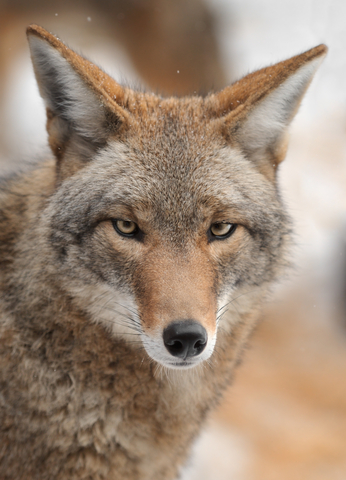How to handle a coyote encounter!

Recently, there have been a number of coyote sightings throughout North Jersey, and it’s important to be prepared in case it ever happens to you. A recent announcement by the Township of Montclair discussed the number of coyote sightings that have been reported in this part of the state. The NJDEP Division of Fish and Wildlife provides important information about avoiding conflict situations with coyotes.
According to the announcement, “coyotes play an important role in the ecosystem, helping to keep rodent populations under control. They are by nature wary of humans. However, coyote behavior changes if given access to human food and garbage. They lose caution and fear. They may cause property damage and threaten human safety, requiring euthanasia. Relocating a problem coyote is not an option because it only moves the problem to someone else’s neighborhood. If you observe coyotes in the daytime that show no fear of humans or if a coyote attacks a person, immediately contact the Montclair Police Department (973-744-1234) and the Division of Fish and Wildlife (908-735-8793); outside of normal business hours call the DEP Hotline at 877-WARN-DEP.”
The following are some guidelines that can help reduce the likelihood of conflicts with coyotes:
- Never feed a coyote. Deliberately feeding coyotes puts pets and other residents in the neighborhood at risk.
- Feeding pet cats and/or feral (wild) cats outdoors can attract coyotes. The coyotes feed on the pet food and also prey upon the cats.
- Put garbage in tightly closed containers that cannot be tipped over.
- Remove sources of water, especially in dry climates.
- Bring pets in at night.
- Put away bird feeders at night to avoid attracting rodents and other coyote prey.
- Provide secure enclosures for rabbits, poultry, and other farm animals.
- Pick up fallen fruit and cover compost piles.
- Although extremely rare, coyotes have been known to attack humans. Parents should monitor their children, even in familiar surroundings, such as backyards.
- Install motion-sensitive lighting around the house.
- Clear brush and dense weeds from around dwellings – this reduces protective cover for coyotes and makes the area less attractive to rodents and rabbits. Coyotes, as well as other predators, are attracted to areas where rodents are concentrated like woodpiles.
- If coyotes are present, make sure they know they’re not welcome. Make loud noises, blast a canned air siren, throw rocks or spray them with a garden hose.
If you encounter a coyote, is important to follow these tips for your safety!

You must be logged in to post a comment Login